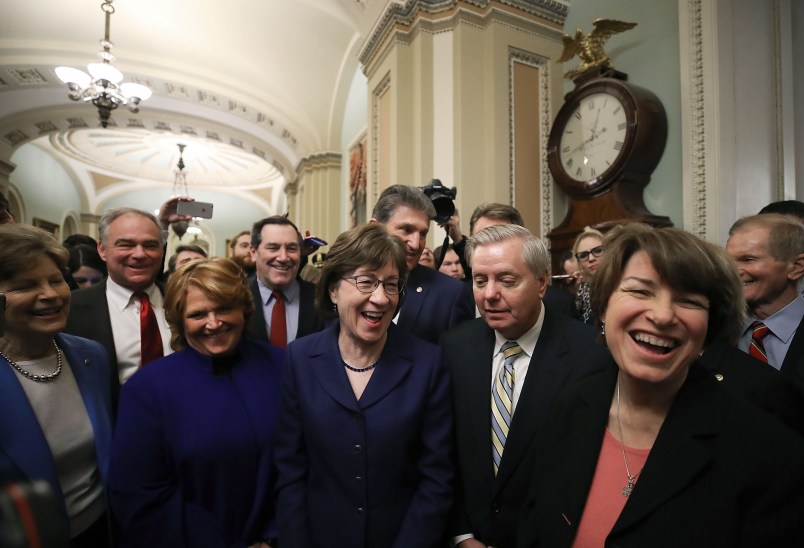A small coalition of senators from both sides of the aisle attempting to hammer out an immigration deal in the next few weeks has ballooned into a working group of dozens, many of whom have little to no experience with immigration policy.
With the March 5 deadline for protecting DACA recipients from deportation looming, Senate staffers tell TPM the “unwieldy” group of nearly 40 is still talking “in broad strokes.” If they can’t put together a bill by Feb. 8—the deadline imposed as part of the deal to end the government shutdown—the proposal crafted by Sens. Dick Durbin (D-IL) and Lindsey Graham (R-SC), which has already been rejected by the White House, may be the “only game in town.”
As a weary-eyed Sen. Lindsey Graham (R-SC) dashed through the basement of the Capitol Thursday afternoon, he told TPM he was well aware the clock is ticking for a resolution on DACA.
“We’ve got March 5 and February 8 breathing down on us,” he said.
Despite that tight timeline, Graham argued that the sprawling size of the working group was a benefit, not a liability.
“I’ve been doing this for 10 years with small groups and large groups,” he said. “The fact that more people are involved is good. The more people who want to see the Senate operate effectively, the better.”
Several other lawmakers involved in the talks also defended the high number of participants, saying such a showing was important for convincing the public and GOP leaders to take them seriously and not dismiss their work as a “fringe effort.”
But lawmakers who have long been involved with the issue, and immigrant rights’ advocates anxiously watching the negotiations’ process, aren’t so sure.
Asked if size of the bipartisan group is helpful to quickly reaching an agreement, Sen. Chris Murphy (D-CT) laughed.
“Probably not,” he said. “In the end, it’s going to be a handful of senators—most likely Durbin, Schumer, McConnell and Cornyn—writing this bill. Having the input is important, but you’re not going to have 36 senators write the thing.”
Murphy added that he finds the lack of experience among several members of the group concerning. “My worry is that a lot of people writing this bill have never worked on immigration before,” he said.
The Republicans whose views are furthest to the right on immigration—such as Sen. Ted Cruz (R-TX), who declared Thursday he would oppose anything with a path to citizenship for DACA recipients—have not been attending the bipartisan talks. Neither have the senators with the most progressive immigration stances, such as Kamala Harris (D-CA). But a handful of lawmakers with deeply conservative views, such at GOP Whip John Cornyn (R-TX), and longtime advocates for the DREAM Act like Durbin, have attempted to hash out their differences in the first few meetings.
“There’s a big range of views,” Sen. Chris Coons (D-DE), who has been attending the talks, told TPM. “What we’re going to listen to a lot of different proposals and see what is possible.”
But with the deadline for bringing something to the Senate floor just a few short weeks away, the people with the most riding on the outcome are starting to sweat.
“I am enthused that many hands are in the kitchen helping to put together something, but I support a thinner approach that doesn’t include 40 people in a room,” Juan Escalante, a DACA recipient working with the advocacy group America’s Voice, told TPM. “How are we going to actually reach an agreement by February 8? By refocusing in a much narrower manner, looking into the main two points: the DREAM Act and a border security package. We have to make sure this doesn’t become a basket for the entire Republican immigration agenda, where they try to use the lives of 700,000 people to get what they couldn’t get in any other scenario.”
“If we don’t narrow this down,” Escalante warned, “we’re going to end up right where we started on March 5″—the day the Trump administration mandated that DACA protections expire.







Someone please take Manchin, Heitkamp and the other DINO imbeciles who are more concerned with re-election than doing the right thing and lock them in a closet in the Capitol basement so they’re nowhere near this fucking thing.
I think that the more people whom are involved the better because it will be harder for Trump to shoot down something worked on by so many Senators and may put some pressure on Ryan to allow a vote in the House. I would like to see more House members involved in this because all this work will be meaningless if the Senate gets something together and it’s DOA in the House.
Trump has introduced several mortal threats to the Republic. The attempted firing of Mueller is one of them. Legislatively speaking, his proposal on immigration is another such threat. That proposal, if it were ever enacted into law, would be a roadmap for a white power takeover and systematic disenfranchisement of the non-white citizenry. It gives them a green light to deport 11 million undocumented individuals. It will then encourage them to take on green card holders and naturalized citizens. They’ll be able to politically demagogue the issue: promising voters that a white nation is a realistic possibility even amidst demographic change.
So with that backdrop, if 40 Senators are talking about immigration, that’s not a bad thing in my view. The proposal will likely be much more modest. With Trump and his WH in a load of trouble over the Russia investigation, it is possible for a committed Senate consensus to push this issue in the right direction.
All this noise and there’s still a 95% chance Ryan doesn’t even put it up for a vote in the House.
Trump flip flops as easily as he breathes. The more support there is for whatever eventual bill is a good thing.